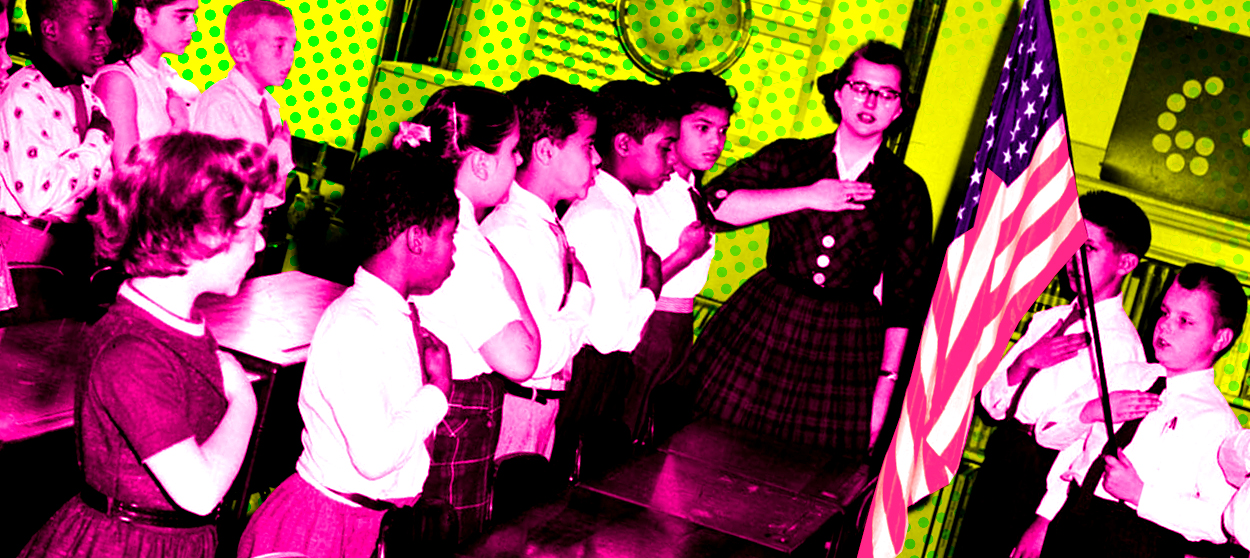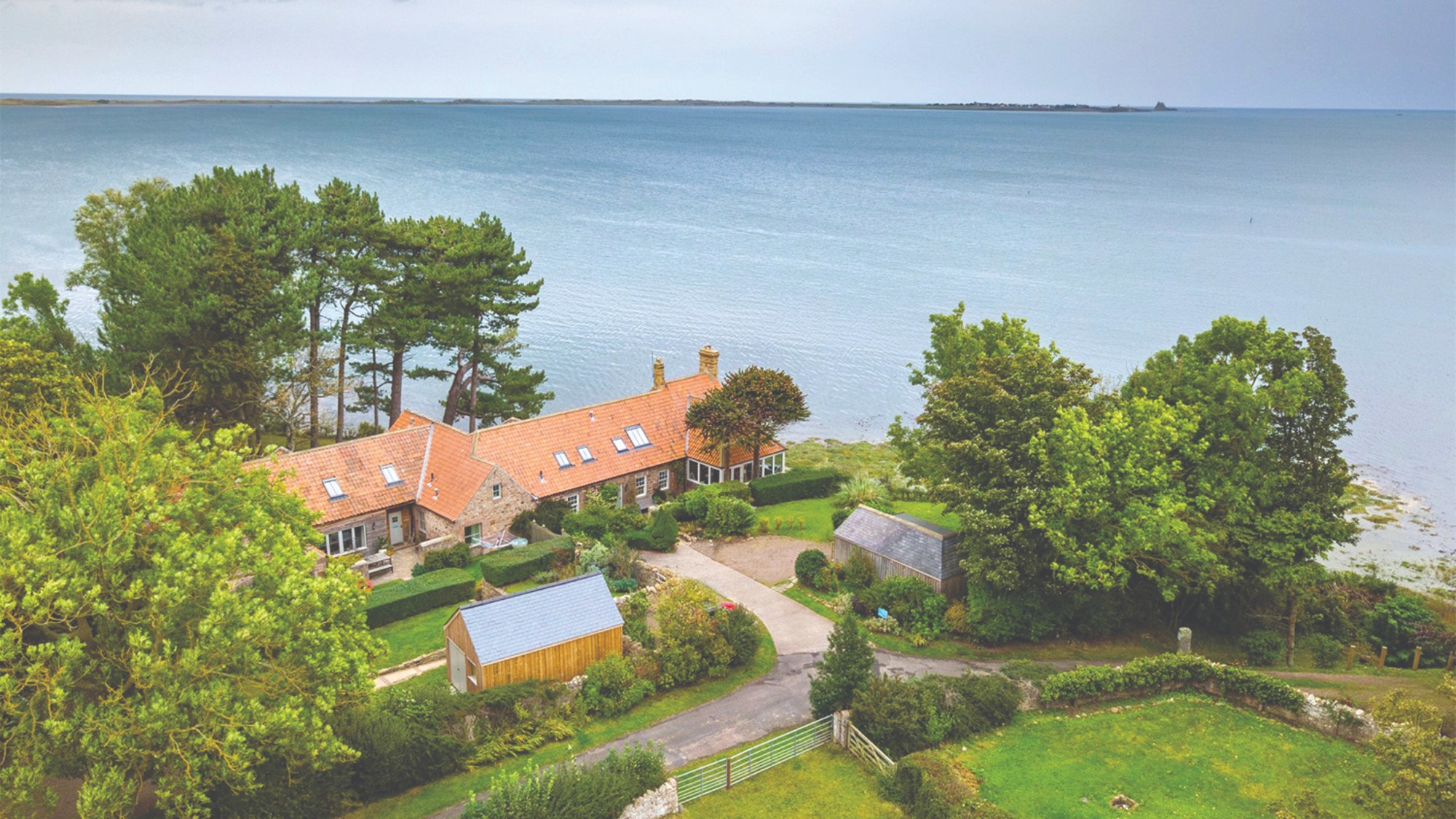The Pledge of Allegiance is not normal
Most democracies don't require constant performance of a loyalty pledge to a national flag


A free daily email with the biggest news stories of the day – and the best features from TheWeek.com
You are now subscribed
Your newsletter sign-up was successful
"The Pledge of Allegiance to our great Country, in St. Louis Park, Minnesota, is under siege," President Trump announced on Twitter early Thursday. "That is why I am going to win the Great State of Minnesota in the 2020 Election. People are sick and tired of this stupidity and disloyalty to our wonderful USA!"
I live just a few miles from St. Louis Park and was surprised to learn of this onslaught of sedition, which despite the apparent gravity of the situation is not exactly dominating local news. It turns out the "siege" in question is rather less dramatic than Trump's tweet suggests: The city council unanimously decided to stop reciting the pledge at the start of its meetings. Not everyone who participates in city business is a citizen, noted one council member, so they shouldn't have to "pledge their allegiance to our country in order to tell us what their input is about a sidewalk in front of their home." Some people are not pleased with this choice, and the president is among them.
This anger over removing constant performance of a loyalty pledge to our national flag from a mundane gathering of local government is not surprising. But it should be, because the Pledge of Allegiance is not normal. It feels normal to Americans, yes, because most of us spend 13 years of primary education saying it weekly, if not daily. But that too isn't normal — at least, not by global standards (India is a rare exception), and especially not for countries with even a pretense of democracy.
The Week
Escape your echo chamber. Get the facts behind the news, plus analysis from multiple perspectives.

Sign up for The Week's Free Newsletters
From our morning news briefing to a weekly Good News Newsletter, get the best of The Week delivered directly to your inbox.
From our morning news briefing to a weekly Good News Newsletter, get the best of The Week delivered directly to your inbox.
One of my less productive habits is reading Ask Reddit, where users discuss with some frequency what U.S. governance and culture looks like to outsiders. The pledge always comes up. "I'd like to offer a European perspective, and maybe explain why our reaction to the pledge ranges from mild discomfort through disgust to outright horror," begins the top comment in one pledge-specific thread. It's not about the content of the pledge, like the "under God" clause around which pledge debates in America often revolve. Rather, it's about "the very idea of having such a thing." Maybe it's not actually "creepy or fascist," the comment allowed, but it sure feels that way if you're not American.
Particularly unsettling to the outside observer is the way the pledge is used in our schools. It doesn't feel strange if you're 7 and that's all you know, but if you're not 7 and you didn't grow up this way ... well, it doesn't look good. As a classroom of elementary-age children intone in a classic sketch from comedy troupe The Whitest Kids You Know, it's objectively "creepy that us little, little kids mindlessly recite this anthem every day and pledge their life to a government before they're old enough to really think about what they're saying."
We'd easily recognize the creepiness in other contexts: What if the pledge were to the flag of Cuba? The USSR? North Korea? (Kim Jong Un's government has an anthem which includes a loyalty pledge: "We devote our bodies and minds to serving this Korea forever.") I attended a Chinese public school in third grade, and while I can't be confident my memory is correct, I don't remember the class doing any sort of loyalty pledge despite our location under literal communism.
Similarly unusual in international context is our habit of playing the national anthem before sporting events. Other countries typically do not do this. Sports are just sports, not opportunities for gratuitous displays of patriotism. That's not because people in other countries are less patriotic, though it's true Americans are disproportionately likely to believe our nation is the best in the world. It's just that adding the anthem, a practice made common in the States to gin up support for joining World War I, is not considered necessary. Unless it's an international competition, what does the national anthem have to do with a ball game?
A free daily email with the biggest news stories of the day – and the best features from TheWeek.com
The unnecessary insertion of these patriotic rituals into ordinary life is troubling in several ways. It creates a needless source of social pressure and even conflict for those who for whatever reason — lack of citizenship, as at those city council meetings, or religious convictions like mine — are unwilling or unable to say the pledge. This is not a great hardship for adults, perhaps, but it is for children. No one wants to be the weirdo, the kid who "hates America." Beyond possible social consequences, declining to say the pledge in school can land you in suspension or a legal mess despite the Supreme Court's clear conclusion that participation cannot be mandatory.
Our national fixation with the pledge and anthem is also a poor fit for our supposed ethos of limited government, of a state which is always the public's servant and never its master. At its best, American patriotism is not a top-down, self-serious policing of national loyalty. Such frequent expression of national devotion is better suited to autocracy than a free country where the government ostensibly functions at the people's pleasure, not the other way around.
The Pledge of Allegiance isn't normal, and it certainly shouldn't be normal here.
Bonnie Kristian was a deputy editor and acting editor-in-chief of TheWeek.com. She is a columnist at Christianity Today and author of Untrustworthy: The Knowledge Crisis Breaking Our Brains, Polluting Our Politics, and Corrupting Christian Community (forthcoming 2022) and A Flexible Faith: Rethinking What It Means to Follow Jesus Today (2018). Her writing has also appeared at Time Magazine, CNN, USA Today, Newsweek, the Los Angeles Times, and The American Conservative, among other outlets.
-
 What to watch out for at the Winter Olympics
What to watch out for at the Winter OlympicsThe Explainer Family dynasties, Ice agents and unlikely heroes are expected at the tournament
-
 Properties of the week: houses near spectacular coastal walks
Properties of the week: houses near spectacular coastal walksThe Week Recommends Featuring homes in Cornwall, Devon and Northumberland
-
 Will Beatrice and Eugenie be dragged into the Epstein scandal?
Will Beatrice and Eugenie be dragged into the Epstein scandal?Talking Point The latest slew of embarrassing emails from Fergie to the notorious sex offender have put her daughters in a deeply uncomfortable position
-
 The billionaires’ wealth tax: a catastrophe for California?
The billionaires’ wealth tax: a catastrophe for California?Talking Point Peter Thiel and Larry Page preparing to change state residency
-
 Bari Weiss’ ‘60 Minutes’ scandal is about more than one report
Bari Weiss’ ‘60 Minutes’ scandal is about more than one reportIN THE SPOTLIGHT By blocking an approved segment on a controversial prison holding US deportees in El Salvador, the editor-in-chief of CBS News has become the main story
-
 Has Zohran Mamdani shown the Democrats how to win again?
Has Zohran Mamdani shown the Democrats how to win again?Today’s Big Question New York City mayoral election touted as victory for left-wing populists but moderate centrist wins elsewhere present more complex path for Democratic Party
-
 Millions turn out for anti-Trump ‘No Kings’ rallies
Millions turn out for anti-Trump ‘No Kings’ ralliesSpeed Read An estimated 7 million people participated, 2 million more than at the first ‘No Kings’ protest in June
-
 Ghislaine Maxwell: angling for a Trump pardon
Ghislaine Maxwell: angling for a Trump pardonTalking Point Convicted sex trafficker's testimony could shed new light on president's links to Jeffrey Epstein
-
 The last words and final moments of 40 presidents
The last words and final moments of 40 presidentsThe Explainer Some are eloquent quotes worthy of the holders of the highest office in the nation, and others... aren't
-
 The JFK files: the truth at last?
The JFK files: the truth at last?In The Spotlight More than 64,000 previously classified documents relating the 1963 assassination of John F. Kennedy have been released by the Trump administration
-
 'Seriously, not literally': how should the world take Donald Trump?
'Seriously, not literally': how should the world take Donald Trump?Today's big question White House rhetoric and reality look likely to become increasingly blurred
